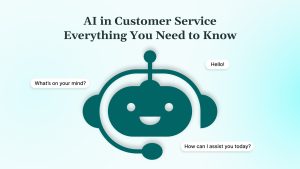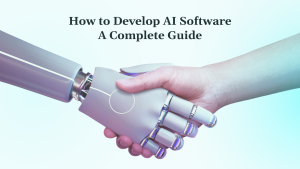Machine learning (ML) has evolved from a technological trend to a business imperative. Businesses in industries such as HealthTech, FinTech, EdTech, and Logistics are using the power of data-driven AI models to achieve breakthrough results.
However, while the potential for machine learning is immense, effectively implementing and scaling AI requires expert guidance. That is where machine learning consulting firms come into play.
In this blog, we will look into how ML consulting firms can transform your business, the specific services they offer, and how DEVtrust can help you utilize machine learning to enhance your business outcomes.
Key Takeaways
- Machine learning consulting enables businesses to implement AI models that address specific challenges and enhance their performance.
- Custom ML solutions are designed to meet the unique needs of industries like HealthTech, FinTech, EdTech, and Logistics.
- Consultants handle all stages from data preparation to model development, deployment, and integration with existing systems.
- Automation and efficiency are key benefits, reducing manual tasks and improving accuracy across operations.
- Data-driven insights from ML models support informed decision-making, leading to better business outcomes and growth.
What is Machine Learning Consulting?
At its core, machine learning consulting refers to the expertise provided by AI professionals who help businesses integrate and use machine learning models to solve real-world business problems. These consultants serve as:
- Strategic partners.
- Assesses your business’s needs.
- Evaluates data quality.
- Build custom models.
- Ensure seamless integration with existing operations.
Unlike other AI technologies, machine learning does not just process predefined information; it learns from data and adapts over time. This adaptability makes it a powerful tool across industries. However, the complexity of ML model development, data preparation, and system integration often requires expert guidance.
What Do Machine Learning Consultants Do?
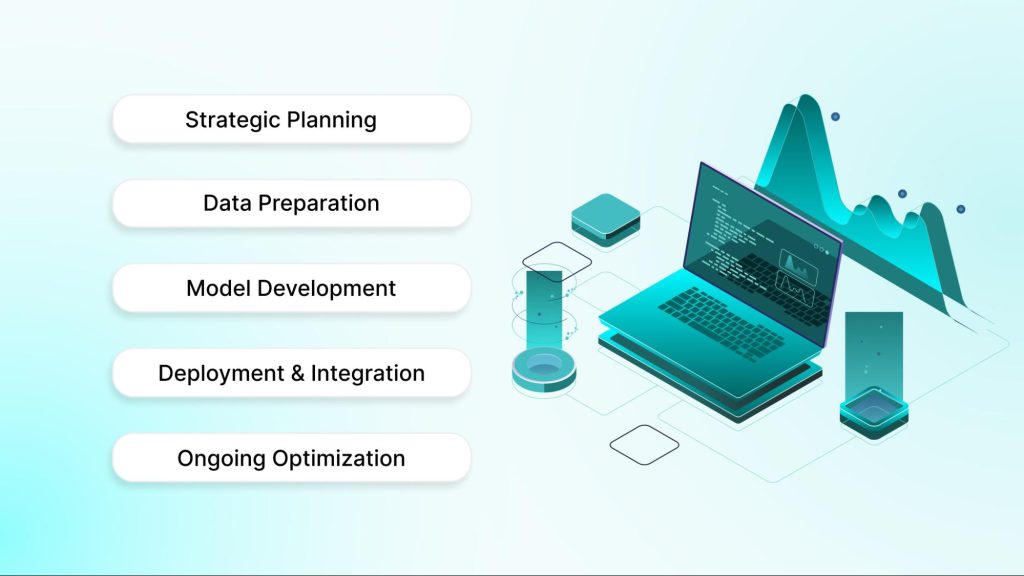
ML consultants typically provide the following services:
- Strategic Planning: Identifying where ML can create value in your business and formulating an implementation plan.
- Data Preparation: Ensuring your data is clean, structured, and usable for training ML models.
- Model Development: Building custom algorithms to solve specific business problems.
- Deployment & Integration: Integrating models into your existing workflows, ensuring smooth operation.
- Ongoing Optimization: Continuously monitoring model performance and refining it to improve accuracy and efficiency.
At DEVtrust, we take a bespoke approach to ML consulting, ensuring that every solution is tailored to address the unique needs of your industry.
Why You Need Machine Learning Consulting
While businesses may have data, effectively integrating ML requires a strategic vision and technical expertise. Here is why machine learning consulting is critical:
1. Industry-Specific Expertise
Each industry has unique challenges. In HealthTech, FinTech, EdTech, and Logistics, the problems you face require tailored ML solutions that align with specific business needs. Machine learning consultants possess both industry experience and technical expertise, which is crucial for building effective models.
For example:
- HealthTech: Building predictive models for disease diagnosis requires a thorough understanding of medical data privacy and accuracy.
- FinTech: Fraud detection systems in finance need advanced algorithms to detect unusual patterns in large volumes of transactional data.
- EdTech: Creating adaptive learning systems requires an understanding of educational theories and the ability to analyze data effectively.
- Logistics: Optimizing supply chains involves analyzing large datasets to predict demand, manage inventory, and optimize delivery routes.
ML consultants understand these sector-specific challenges and design custom solutions that ensure measurable results.
2. Efficiency and Automation
Implementing machine learning models can automate processes that would otherwise require manual intervention. This not only increases efficiency but also reduces the chances of human error. For instance:
- In HealthTech, ML can automate patient data processing, reducing administrative workloads and allowing healthcare professionals to focus on patient care.
- In Logistics, ML can optimize route planning, saving time and reducing fuel consumption.
Automating repetitive tasks allows businesses to focus more on strategic objectives, rather than being bogged down by daily operations.
3. Data-Driven Decision-Making
One of the most significant benefits of machine learning is its ability to inform data-driven decisions. For companies in FinTech, HealthTech, EdTech, and Logistics, ML enables:
- Predictive risk assessments in FinTech.
- Data-backed patient care decisions in HealthTech.
- Adaptive learning paths in EdTech that adjust based on student performance.
- Optimized supply chain management in Logistics.
With ML models, businesses can confidently make data-backed decisions that improve operational efficiency and customer experience.
How Machine Learning Consulting Works: A Detailed Step-by-Step Blueprint
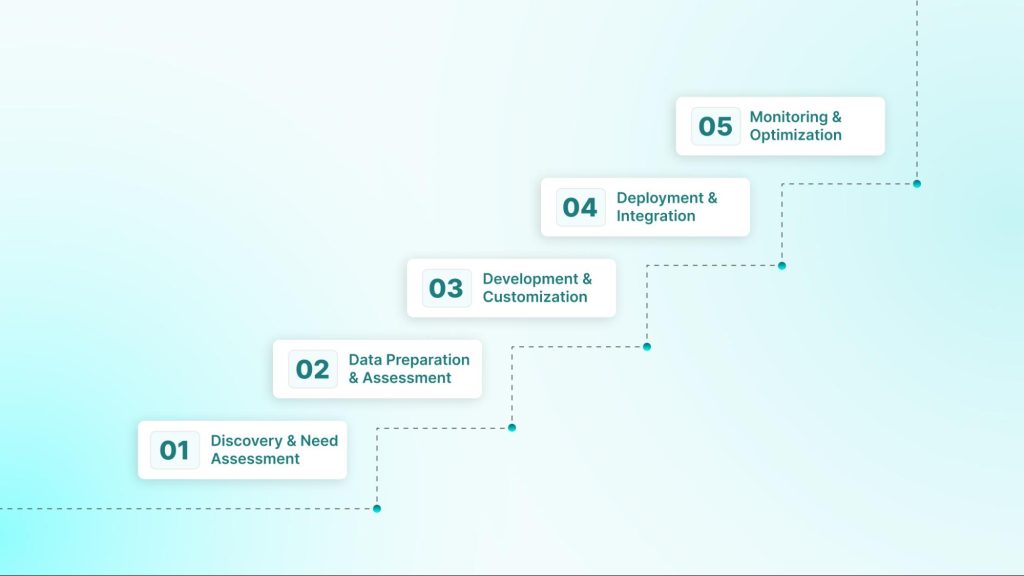
Successful machine learning adoption is a collaborative and meticulous journey, uniquely tailored to each business. Below is a phase-by-phase guide to the consulting approach, featuring concrete actions, industry use cases, and practical considerations.
1. Discovery & Needs Assessment: Understanding Your Unique Landscape
To gain a deep understanding of business objectives, pain points, and how machine learning can help achieve the desired vision.
What Happens:
- Stakeholder Workshops to uncover goals and challenges across departments.
- Business Process Mapping to analyze workflows and identify where automation or analytics can provide the biggest payoff.
- Problem Scoping to pinpoint the exact use case (e.g., predictive analytics, automation, anomaly detection).
- Data Inventory Audit of all available data sources (transactions, IoT devices, databases).
Industry Use Cases:
- FinTech: Real-time fraud detection and customer segmentation.
- HealthTech: Predictive analytics for identifying high-risk patients or automating medical imaging analysis.
- Logistics: Optimizing last-mile delivery and forecasting demand spikes.
2. Data Preparation & Quality Assessment: Laying the Foundation
Ensure available data is reliable, complete, and appropriately formatted for robust modeling.
What Happens:
- Data Cleaning: Remove errors, duplicates, and fill missing values using intelligent imputation.
- Data Transformation: Standardize formats and engineer relevant features (e.g., customer lifetime value).
- Data Augmentation: Generate synthetic data or integrate external datasets for skewed or sparse data.
- Compliance Review: Ensure data use complies with relevant regulations, such as HIPAA, GDPR, and PCI DSS, depending on the industry’s specific requirements.
Industry Use Cases:
- HealthTech: Cleaning electronic health records, engineering features for disease prediction.
- EdTech: Combining academic performance with engagement metrics for holistic insights.
- Logistics: Consolidating disparate supply chain data into unified datasets.
3. Model Development & Customization: Engineering the Intelligence
Design, build, and rigorously validate a machine learning model tailored to business needs.
What Happens:
- Algorithm Selection: Choose algorithm type based on task (e.g., classification, regression, clustering, deep learning).
- Model Customization: Adapt models to handle data quirks and business rules.
- Testing & Validation: Use cross-validation, A/B testing, and relevant metrics (precision, recall, ROC curves).
- Explainability: Utilize explainable AI techniques to enable users to understand and trust predictions.
Industry Use Cases:
- FinTech: Real-time transaction anomaly detection.
- HealthTech: Deep learning models interpreting medical images with transparent probability scores.
- EdTech: Adaptive learning systems personalizing content delivery.
4. Deployment & Integration: Bringing ML to Life
Implement the machine learning solution in the operational environment to ensure seamless performance and adoption.
What Happens:
- Staged Rollouts with pilots or sandbox environments for testing.
- System Integration connecting models to CRMs, ERPs, or specific platforms.
- Flexible Deployment on cloud, on-premises, or hybrid infrastructures according to compliance and scalability requirements.
- Security Protocols ensuring data privacy, secure access, and regulatory compliance.
- Change Management, including training users and collecting feedback.
Industry Use Cases:
- Logistics: Route optimization models integrated with dispatch systems.
- HealthTech: Decision support tools embedded in electronic health records workflows.
- FinTech: Fraud alert systems incorporated into banking dashboards.
5. Continuous Monitoring & Optimization: Ensuring Enduring Value
Maintain and improve model effectiveness as business conditions and data evolve.
What Happens:
- Performance Dashboards to visualize KPIs, such as accuracy and false positives.
- Model Drift Monitoring to detect performance degradation over time.
- Ongoing Retraining using fresh data and feedback loops for continuous improvement.
- Regulatory Compliance Updates respond proactively to changes in laws or industry standards.
Industry Use Cases:
- EdTech: Updating adaptive curricula models to align with new academic standards.
- FinTech: Refining fraud detection models to counter new scam tactics.
- Logistics: Adjusting forecasting and optimization models as traffic and delivery routes change.
Industry-Specific Machine Learning Consulting
Machine learning offers immense potential across various industries, providing tailored solutions to specific challenges. Here is how ML is transforming key sectors:
1. HealthTech: Revolutionizing Patient Care with Machine Learning
In HealthTech, ML can be used to predict patient outcomes, enhance diagnostic accuracy, and streamline hospital management. ML consultants in this space are tasked with creating AI-driven solutions that help healthcare providers:
- Predict disease outbreaks and identify high-risk patients through early warning systems.
- Automate medical imaging analysis to detect diseases such as cancer, thereby significantly improving diagnostic accuracy.
- Optimize hospital operations by predicting patient flow, managing resources, and scheduling appointments more efficiently.
DEVtrust’s Expertise: Our custom ML models ensure HIPAA-compliant solutions that enhance patient care while optimizing hospital management systems.
2. FinTech: Enhancing Fraud Detection and Risk Management
Machine learning plays a pivotal role in FinTech by helping companies detect fraud, optimize credit scoring, and predict financial market trends.
- Fraud Detection: ML models analyze transaction patterns in real-time and identify anomalies, preventing fraudulent activities.
- Predictive Analytics: Models forecast market behavior, enabling investors and financial institutions to make more informed decisions.
- Credit Risk Assessment: ML allows for automated credit scoring, improving the speed and accuracy of loan approvals.
DEVtrust’s Expertise: We specialize in developing predictive models for risk management and automating fraud detection, ensuring financial institutions stay ahead of potential risks.
3. EdTech: Personalizing Learning and Enhancing Student Success
In EdTech, ML enables personalized learning experiences that adapt to students’ unique needs and learning speeds. Key applications include:
- Adaptive Learning Systems: Tailoring educational content to individual students based on their learning patterns and performance.
- Automated Grading: AI-driven systems that automate grading, giving teachers more time for engagement and instruction.
- Predictive Analytics: Identifying at-risk students early and providing interventions to improve their academic outcomes.
DEVtrust’s Expertise: We help EdTech companies implement AI-powered learning management systems (LMS) that provide personalized educational experiences and automate administrative processes.
Also Read: How Machine Learning is Transforming Education
4. Logistics: Optimizing Supply Chains with Machine Learning
In Logistics, machine learning is used to enhance efficiency, reduce costs, and streamline operations:
- Predictive Analytics for Supply Chains: ML forecasts demand, optimizing inventory management, and reducing stockouts.
- Route Optimization: Real-time route planning using ML ensures deliveries are made on time, reducing fuel consumption and improving efficiency.
- Real-Time Tracking: ML models improve real-time fleet tracking, ensuring delivery accuracy and operational efficiency.
DEVtrust’s Expertise: Our custom AI/ML solutions help logistics companies streamline operations, improve route planning, and predict market demands for better efficiency.
Also Read: How AI Is Transforming Transportation and Logistics
Case Study: Moeen Med – Machine Learning to Automate Physician Documentation
MoeenMed, a HIPAA-compliant tool powered by OpenAI and Nabla API, uses machine learning to automate physician documentation. The tool transcribes conversations between physicians and patients, generating compliant and accurate clinical notes that significantly reduce manual effort and time spent on administrative tasks.
Challenges
- Documentation Time: Physicians were spending a significant amount of time documenting patient details, treatment plans, and medical records, resulting in inefficiencies.
- Compliance: Ensuring medical documentation adhered to strict regulations, such as HIPAA, was a constant challenge.
- Distraction: Manual documentation distracted physicians from their primary focus, patient consultation.
Solutions Blueprint
DEVtrust implemented several machine learning-based solutions to tackle these challenges:
- Automated Documentation: MoeenMed leverages machine learning models powered by Azure’s speech-to-text technology and Nabla API to generate documentation automatically, saving time and reducing errors.
- Accuracy: The AI-generated documents adhere to standardized templates, ensuring they meet regulatory and legal standards for accuracy and compliance.
- HIPAA Compliance: All documents generated are HIPAA-compliant, ensuring patient data is securely processed and stored.
- Focus on Core Responsibilities: By automating administrative tasks, MoeenMed allows physicians to dedicate more time to patient care.
Results
- 98% Reduction in Manual Efforts: Automation significantly reduced the time spent on documentation.
- 95% Increased User Trust: Physicians trust the AI-powered system for generating accurate, compliant documentation.
- 97% Improvement in Document Handling Efficiency: Document creation and management became more efficient and streamlined.
- 92% Enhanced Productivity: Physicians were able to focus more on patient care, leading to greater productivity and improved patient outcomes.
The platform, powered by machine learning and AI, offers a user-friendly interface that seamlessly integrates transcription and documentation automation for healthcare professionals.
Ready to implement machine learning solutions for your business? Contact us today to discover how we can streamline your processes with AI-powered tools!
Choosing the Right Machine Learning Consulting Partner
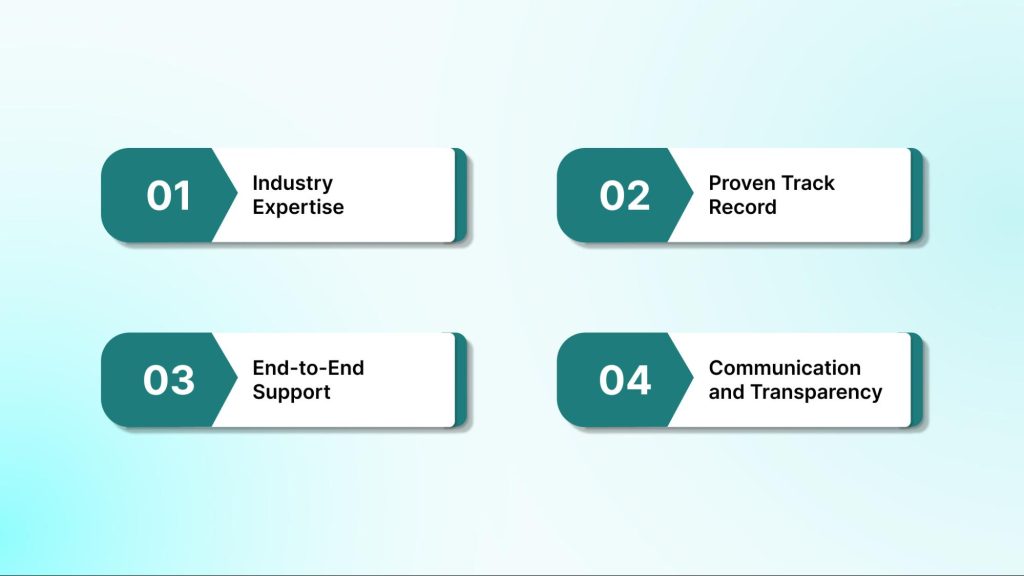
Selecting the right ML consulting firm is crucial to ensuring that your AI/ML projects are executed successfully. Here is what you should consider when choosing a consulting partner:
1. Industry Expertise
Machine learning is not a one-size-fits-all solution. The best consultants will have industry-specific experience. This is crucial because each industry has unique data types, regulatory requirements, and business processes. For example:
- HealthTech requires consultants who understand medical data privacy and clinical workflows.
- FinTech consultants should be well-versed in financial regulations and security protocols to ensure compliance and protect sensitive data.
2. Proven Track Record
A strong portfolio is essential. Look for firms with case studies that demonstrate real-world success in implementing ML models that solved similar business problems. A proven track record in your industry adds credibility to their ability to deliver results.
3. End-to-End Support
Look for a firm that offers end-to-end services, from consultation and strategy to model development and deployment.
4. Clear Communication and Transparency
Effective communication is critical throughout the process. Your consulting partner should provide:
- Clear documentation of the ML model development process.
- Regular updates and check-ins to ensure alignment with business goals.
- Transparent discussions about challenges and potential roadblocks during the project.
Conclusion
Machine learning consulting is a strategic asset that can help your business navigate the complexities of AI. Whether you are in HealthTech, FinTech, EdTech, or Logistics, partnering with a skilled consultant like DEVtrust can ensure your ML solutions are effective, scalable, and tailored to your unique business needs. By leveraging custom-built models and data-driven insights, we can help you improve operational efficiency, enhance decision-making, and drive long-term growth.
If you are ready to use machine learning to transform your business, DEVtrust is here to help you every step of the way. Contact us today to get started on your AI-powered journey.
Machine Learning Consulting Services and Solutions
Transform your business with expert machine learning consulting. Identify ML use cases, align strategies, and optimize performance. Contact us!
Contact Us
